Mozilla Blog
Adding More Policy Firepower to the Mozilla Network
In June, Mozilla launched a new fellowship that brings together policy experts from around the world to advance crucial tech policy efforts. Today, we are excited to announce the appointment of seven advisors to help steer this fellowship into the future. We are also announcing one new fellow, bringing the cohort to 11 fellows from four countries who are already up to great work.
Over the past three months, Mozilla’s Tech Policy Fellows have been digging into their projects to keep the Internet open and freely accessible to all. With most fellows joining directly out of government service, they’re continuing to move forward some of the urgent policy efforts they had been leading, and working to avoid any backsliding that might come with government transitions.
The fellows’ work is focused on protecting net neutrality, advancing policies around artificial intelligence and the Internet of Things, promoting affordable broadband service for vulnerable communities, and more. Amba Kak is our most recent addition, starting this month to work on promoting net neutrality in India.
To advance this work, the fellows are meeting with policymakers inside and outside of government; they’re keynoting major events and giving press interviews about the importance of these topics; and in the coming weeks, they’ll share more about their work with the Mozilla network on our network blog.
To give guidance and support to the fellows, Mozilla formed an Advisory Board comprised of some of the world’s top experts and supporters of a free and open Internet.
These seven individuals living in six different countries bring deep expertise in privacy, net neutrality, intellectual property, and digital inclusion. They will serve as a resource to the fellows as they pursue their individual projects and to Mozilla as we refine and institutionalize this program.
The fellows and advisors will gather next month at MozFest, Mozilla’s annual celebration of the Internet. They will collaborate on the fellows’ work and the fellows will lead sessions on tech policy topics during the weekend-long festival.
The advisors will also work with us to identify the next cohort of Tech Policy Fellows in early 2018 and will advise the program and the fellows for the coming two years. We look forward to bringing them on board and getting to work to continue advancing tech policy around the globe.
Meet the Tech Policy Fellowship Advisory Board:
Celina Beatriz
 Celina Beatriz has a Master’s Degree in Human Rights from Harvard University and an Undergraduate Degree in Law from Pontifical Catholic University (PUC-Rio). She is an expert on human rights and technology. She was a researcher at Human Rights Watch in New York and a Supervisor at the Human Rights Clinic in Fundação Getulio Vargas (FGV Rio). Celina was a consultant for the Harvard Human Rights Clinic, a researcher at ISER, and an Associate of the Children’s and Adolescent’s Rights Protection in Rio de Janeiro. Celina is currently developing research in the human rights and technology field. She is Project Director at the Institute for Technology & Society of Rio de Janeiro (ITS Rio).
Celina Beatriz has a Master’s Degree in Human Rights from Harvard University and an Undergraduate Degree in Law from Pontifical Catholic University (PUC-Rio). She is an expert on human rights and technology. She was a researcher at Human Rights Watch in New York and a Supervisor at the Human Rights Clinic in Fundação Getulio Vargas (FGV Rio). Celina was a consultant for the Harvard Human Rights Clinic, a researcher at ISER, and an Associate of the Children’s and Adolescent’s Rights Protection in Rio de Janeiro. Celina is currently developing research in the human rights and technology field. She is Project Director at the Institute for Technology & Society of Rio de Janeiro (ITS Rio).
Malavika Jayaram
 Malavika Jayaram is the Executive Director of Digital Asia Hub, an independent, non-profit Internet and society research think tank based in Hong Kong, incubated by The Berkman Klein Center for Internet and Society at Harvard University. A practising technology lawyer for over 15 years, she spent eight years in London with global law firm Allen & Overy in the Communications, Media & Technology group, and as Vice President and Technology Counsel at Citigroup. While a partner at Jayaram & Jayaram, India, she was featured in the International Who’s Who of Internet e-Commerce & Data Protection Lawyers, and voted one of India’s leading lawyers.
Malavika Jayaram is the Executive Director of Digital Asia Hub, an independent, non-profit Internet and society research think tank based in Hong Kong, incubated by The Berkman Klein Center for Internet and Society at Harvard University. A practising technology lawyer for over 15 years, she spent eight years in London with global law firm Allen & Overy in the Communications, Media & Technology group, and as Vice President and Technology Counsel at Citigroup. While a partner at Jayaram & Jayaram, India, she was featured in the International Who’s Who of Internet e-Commerce & Data Protection Lawyers, and voted one of India’s leading lawyers.
Malavika taught India’s first course on information technology and law in 1997, and is now Adjunct Faculty at Northwestern University’s Pritzker School of Law, part of the Master of Science in Law program bridging STEM subjects and law. She has been a Fellow with the Centre for Internet & Society, India, since 2009, when she helped start their privacy work. She is on the Advisory Board of the Electronic Privacy Information Center (EPIC), and the Executive Committee of the IEEE Global Initiative for Ethical Considerations in Artificial Intelligence and Autonomous Systems.
Ronaldo Lemos
 Ronaldo Lemos is an internationally respected Brazilian scholar and commentator on technology, intellectual property, and culture. He is a director of the Institute for Technology & Society of Rio de Janeiro (ITS Rio) and professor of law and innovation at the Rio de Janeiro State University (UERJ). He holds law degrees from University of Sao Paulo Law School and Harvard Law and has published a number of books and journal articles. He is currently a Visiting Professor at Columbia University’s School of International and Public Affairs. He has served as the project lead of Creative Commons Brazil since 2003. He is a non-resident visiting scholar with the MIT Media Lab and was a visiting fellow at Princeton University’s Center for Information Technology Policy (CITP) in 2011 and 2012. Lemos is a founder of Overmundo, for which he received the Prix Ars Electronica Golden Nica in the category of digital communities. Lemos was one of the creators of the Marco Civil, a law enacted in 2014 regulating the Internet in Brazil, protecting civil rights, privacy, and net neutrality. In 2015 he was appointed a Young Global Leader by the World Economic Forum. In 2016 he was appointed a fellow with Ashoka. Lemos serves as a board member in various organizations, such as the Mozilla Foundation and Access Now.
Ronaldo Lemos is an internationally respected Brazilian scholar and commentator on technology, intellectual property, and culture. He is a director of the Institute for Technology & Society of Rio de Janeiro (ITS Rio) and professor of law and innovation at the Rio de Janeiro State University (UERJ). He holds law degrees from University of Sao Paulo Law School and Harvard Law and has published a number of books and journal articles. He is currently a Visiting Professor at Columbia University’s School of International and Public Affairs. He has served as the project lead of Creative Commons Brazil since 2003. He is a non-resident visiting scholar with the MIT Media Lab and was a visiting fellow at Princeton University’s Center for Information Technology Policy (CITP) in 2011 and 2012. Lemos is a founder of Overmundo, for which he received the Prix Ars Electronica Golden Nica in the category of digital communities. Lemos was one of the creators of the Marco Civil, a law enacted in 2014 regulating the Internet in Brazil, protecting civil rights, privacy, and net neutrality. In 2015 he was appointed a Young Global Leader by the World Economic Forum. In 2016 he was appointed a fellow with Ashoka. Lemos serves as a board member in various organizations, such as the Mozilla Foundation and Access Now.
Alexander Macgillivray
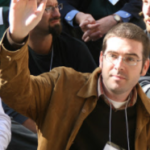 Alexander Macgillivray, also know as “amac,” is curious about many things including law, policy, government, decision making, the Internet, algorithms, social justice, access to information, and the intersection of all of those. He was United States Deputy Chief Technology Officer for the last two years of the Obama Administration. He was Twitter‘s General Counsel, and head of Corporate Development, Public Policy, Communications, and Trust & Safety. Before that he was Deputy General Counsel at Google and created the Product Counsel team. He has served on the board of the Campaign for the Female Education (CAMFED) USA, was one of the early Berkman Klein Center folks, was certified as a First Grade Teacher by the State of New Jersey, and studied Reasoning & Decision Making as an undergraduate. These days he is doing a bunch of coding, writing, and short burst projects with organizations thinking about what they should be doing next.
Alexander Macgillivray, also know as “amac,” is curious about many things including law, policy, government, decision making, the Internet, algorithms, social justice, access to information, and the intersection of all of those. He was United States Deputy Chief Technology Officer for the last two years of the Obama Administration. He was Twitter‘s General Counsel, and head of Corporate Development, Public Policy, Communications, and Trust & Safety. Before that he was Deputy General Counsel at Google and created the Product Counsel team. He has served on the board of the Campaign for the Female Education (CAMFED) USA, was one of the early Berkman Klein Center folks, was certified as a First Grade Teacher by the State of New Jersey, and studied Reasoning & Decision Making as an undergraduate. These days he is doing a bunch of coding, writing, and short burst projects with organizations thinking about what they should be doing next.
Bitange Ndemo
 Bitange Ndemo is an Associate Professor of Entrepreneurship at the University of Nairobi’s Business School. His research centers on the link between ICTs and small and medium enterprises in Kenya, with an emphasis on how ICTs influence economic development in Kenya. Prof. Ndemo is an advisor to several organizations including the Better than Cash Alliance, a global initiative under UNCDF dedicated to promotion of cash alternatives; and the I-Hub, a premier innovation hub in Africa. He also sits on the Board of Research ICT Africa based in South Africa. He is a former Permanent Secretary of Kenya’s Ministry of Information and Communication, where he was credited with facilitating many transformative ICT projects. After years of developing the supply-side of broadband, he has now changed gears to demand-side through assisting start-ups in Africa and playing a key role building sustainable models of innovation hubs. Prof. Ndemo holds a PhD in Industrial Economics from the University of Sheffield in the UK, a Bachelor’s degree in Finance from the University of Minnesota, and an MBA from University of St. Thomas. He is an open data and big data evangelist, and dedicated to simplification / visualization of data for ordinary citizens to consume.
Bitange Ndemo is an Associate Professor of Entrepreneurship at the University of Nairobi’s Business School. His research centers on the link between ICTs and small and medium enterprises in Kenya, with an emphasis on how ICTs influence economic development in Kenya. Prof. Ndemo is an advisor to several organizations including the Better than Cash Alliance, a global initiative under UNCDF dedicated to promotion of cash alternatives; and the I-Hub, a premier innovation hub in Africa. He also sits on the Board of Research ICT Africa based in South Africa. He is a former Permanent Secretary of Kenya’s Ministry of Information and Communication, where he was credited with facilitating many transformative ICT projects. After years of developing the supply-side of broadband, he has now changed gears to demand-side through assisting start-ups in Africa and playing a key role building sustainable models of innovation hubs. Prof. Ndemo holds a PhD in Industrial Economics from the University of Sheffield in the UK, a Bachelor’s degree in Finance from the University of Minnesota, and an MBA from University of St. Thomas. He is an open data and big data evangelist, and dedicated to simplification / visualization of data for ordinary citizens to consume.
Rinalia Abdul Rahim
 Rinalia Abdul Rahim is Managing Director and Chairman of Compass Rose Sdn Bhd. She has 20 years of experience in international development and ICT policy, where she focuses on the issues of access, empowerment, and governance. She currently serves as a member of the Board of Directors at the Internet Corporation for Assigned Names and Numbers (ICANN). From 2001-2008, she was Executive Director of the Global Knowledge Partnership (GKP), which she successfully positioned as the world’s first and leading multi-stakeholder initiative that promoted knowledge and ICT for Development (ICT4D).
Rinalia Abdul Rahim is Managing Director and Chairman of Compass Rose Sdn Bhd. She has 20 years of experience in international development and ICT policy, where she focuses on the issues of access, empowerment, and governance. She currently serves as a member of the Board of Directors at the Internet Corporation for Assigned Names and Numbers (ICANN). From 2001-2008, she was Executive Director of the Global Knowledge Partnership (GKP), which she successfully positioned as the world’s first and leading multi-stakeholder initiative that promoted knowledge and ICT for Development (ICT4D).
From 1997-2001 she worked with the Malaysian Government in developing national ICT policies, strategies and programmes. Some of the strategies and framework were promoted as best practices by the United Nations Development Programme and were adopted by many developing countries across Asia, Africa, and the Middle East. She has held various advisory positions with international, regional, and national bodies, including agencies of the United Nations. She holds a Master’s in Public Policy from Harvard University and a Bachelor’s Degree in Political Science from Princeton University. She is certified in Corporate Governance by INSEAD. Raised in Malaysia, she has lived in the U.S., Hong Kong, Mainland China, and Singapore. She currently resides in Germany.
Nicole Wong
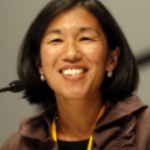 Nicole Wong specializes in assisting high-growth technology companies to develop international privacy and regulatory strategies. She previously served as Deputy U.S. Chief Technology Officer in the Obama Administration, focused on internet, privacy, and innovation policy. Prior to her time in government, Nicole was Google’s Vice President and Deputy General Counsel, and Twitter’s Legal Director for Products. She frequently speaks on issues related to law and technology, including five appearances before the U.S. Congress.
Nicole Wong specializes in assisting high-growth technology companies to develop international privacy and regulatory strategies. She previously served as Deputy U.S. Chief Technology Officer in the Obama Administration, focused on internet, privacy, and innovation policy. Prior to her time in government, Nicole was Google’s Vice President and Deputy General Counsel, and Twitter’s Legal Director for Products. She frequently speaks on issues related to law and technology, including five appearances before the U.S. Congress.
Nicole chairs the board of Friends of Global Voices, a non-profit organization dedicated to supporting citizen and online media projects globally. She also sits on the boards of WITNESS, an organization supporting the use of video to advance human rights, and Mozilla. Nicole currently serves as an advisor to the School of Information at the University of California, Berkeley, Harvard Business School Digital Initiative, the Democratic National Committee Cybersecurity Advisory Board, Refactor Capital, and the Albright Stonebridge Group.
The post Adding More Policy Firepower to the Mozilla Network appeared first on The Mozilla Blog.
Tracking Protection for Firefox for iOS Plus Multi-Tasking in Focus for Android New Today
Across the industry, September is always an exciting month in mobile, and the same is true here at Mozilla.
Today, we’re launching the newest Firefox for iOS alongside an update for the popular Firefox Focus for Android, which we launched in June.
What’s new with Firefox for iOS:
Tracking Protection: Rejoice! For the first time, Firefox users running iOS11 on iPhone and iPad will now have automatic ad and content blocking with Private Browsing mode, as well as the tracking protection option in regular browsing. This feature uses the same ad blocking technology as Firefox Focus for Android and iOS, Firefox for Desktop and Firefox for Android. We’re always looking to bring the latest features to our users, and we’re finally able to deliver it to Firefox for iOS thanks to changes by Apple to enable the option for 3rd party browsers.
Improved Syncing: We’ve offered the ability for users to sync desktop content like passwords, history and bookmarks to mobile, and today we’re enhancing Firefox sync so content on your mobile now syncs back to your desktop.
To get the latest version of Firefox for iOS, on the App Store.
What’s new with Focus for Android:
Multiple Tabs: While simplicity is the name of the game for Firefox Focus, we’ve been listening to you and made the private browsing experience even better with the addition of multitasking support. This means users now have the ability to open multiple web pages at a time and easily switch between tabs in the same session.
You can download Firefox Focus for Android on Google Play.
The post Tracking Protection for Firefox for iOS Plus Multi-Tasking in Focus for Android New Today appeared first on The Mozilla Blog.
Stand Up for Net Neutrality: Help Paperstorm the FCC
In the U.S., net neutrality is under attack.
Ajit Pai, current Chairman of the FCC, put it bluntly: “We need to fire up the weed whacker” and remove rules like net neutrality, he said recently.
To keep net neutrality (and a healthy internet) intact, Mozilla is deploying Paperstorm, our activism website developed alongside design studio Moniker.
Over the next several weeks, we’re asking American internet users to send a salvo of tweets to Chairman Pai. How? Visit Paperstorm.it and start clicking. Each click drops a digital leaflet on the FCC’s headquarters in Washington, D.C. Drop enough leaflets and you can trigger a tweet to Pai.
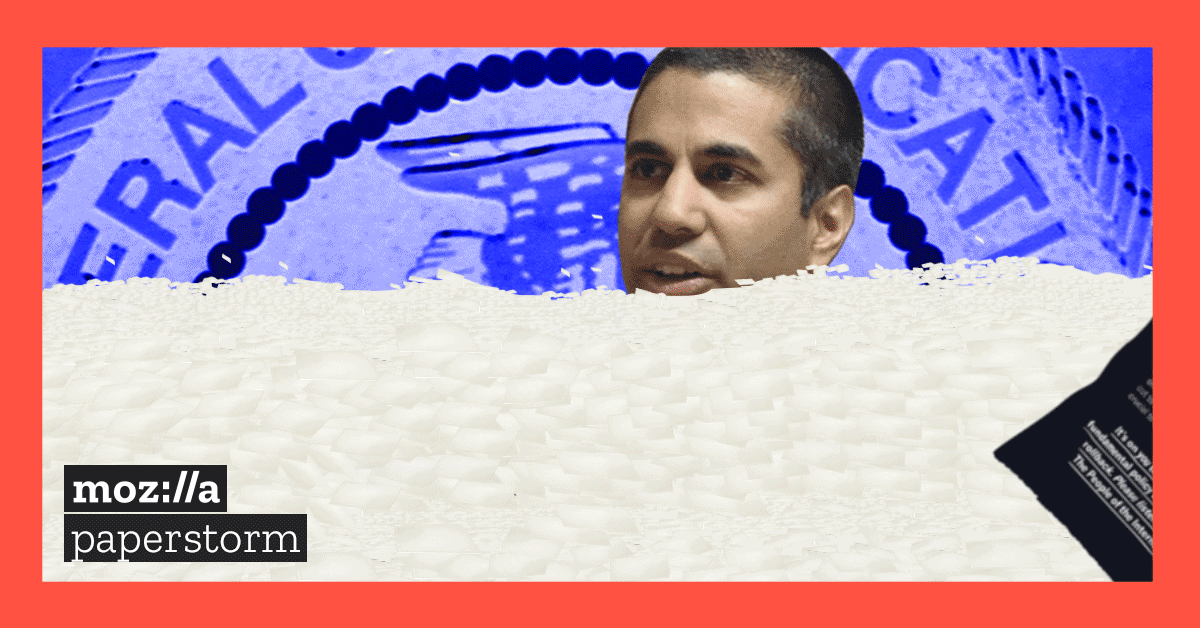
We’re asking Americans to Paperstorm the FCC
Paperstorm is a tongue-in-cheek website. But from past net neutrality efforts, we know that a loud chorus of voices can make an impact. And we need to make an impact quickly: Pai and the FCC commissioners are expected make a net neutrality decision in late fall or early winter of this year.
A net neutrality refresherIn May of this year, Pai introduced his proposal to undo net neutrality by re-re-classifying Internet Service Providers (ISPs) from Title II to Title I under the Communications Act of 1934.
What this means: Under Pai’s proposal, ISPs would be allowed to block, throttle and prioritize (or deprioritize) internet access for Americans. Companies like Comcast and AT&T could selectively slow down or speed up access to online journalism, blogs, films, apps, and other services. This would undo 2015’s hard-won net neutrality protections that took years of hard work.
Net neutrality may seem like an abstract issue, but its impact is anything but. Without it, the internet becomes less open. No net neutrality means fewer opportunities for startups and entrepreneurs, and a chilling effect on innovation, free expression and choice online.
Mozilla Chief Legal and Business Officer Denelle Dixon gives real-life examples of a web without net neutrality: “In the past, without net neutrality protections, ISPs have imposed limits on who can FaceTime and determined how we stream videos, and also adopted underhanded business practices.”
About PaperstormPaperstorm is a digital activism website that urges Pai and the FCC to keep net neutrality intact.
When users visit Paperstorm, they’ll see an aerial view of the FCC headquarters on 12th Street SW in Washington, D.C. With each click of the mouse, users drop a digital leaflet that reads:
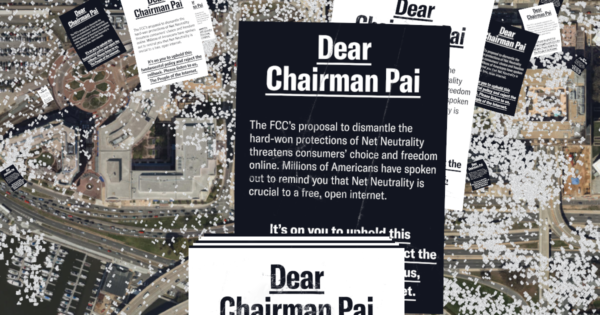
A Paperstorm leaflet
What do these leaflets do? When you drop enough, you can generate a tweet to Pai. Alone, you might drop a small stack of leaflets and send a handful of tweets to Pai. But together, we can drop millions of leaflets and launch tens of thousands of tweets.
Paperstorm is a collaboration between Mozilla and the Amsterdam-based, Webby award-winning design studio Moniker. This is the first time Mozilla and Moniker have deployed Paperstorm in the U.S. Earlier this year, Mozilla and Moniker deployed Paperstorm in the EU to demand common-sense copyright reform — we dropped 60,000,000 leaflets and sent 12,000 tweets to lawmakers.
Part of a larger movementMillions of Americans across party lines support net neutrality. Over the past several months, more than 22 million net neutrality comments have been filed in the FCC’s docket, the vast majority in support of net neutrality.
On July 11, hundreds of organizations banded together in a Day of Action to amplify Americans’ voices. From the ACLU and Amazon to Github and Mozilla, organizations voiced loud support for a free and open internet.
Read about Mozilla’s past net neutrality advocacy.
The post Stand Up for Net Neutrality: Help Paperstorm the FCC appeared first on The Mozilla Blog.
Busting the myth that net neutrality hampers investment
This week I had the opportunity to share Mozilla’s vision for an Internet that is open and accessible to all with the audience at MWC Americas.
I took this opportunity because we are at a pivotal point in the debate between the FCC, companies, and users over the FCC’s proposal to roll back protections for net neutrality. Net neutrality is a key part of ensuring freedom of choice to access content and services for consumers.
Earlier this week Mozilla’s Heather West wrote a letter to FCC Chairman Ajit Pai highlighting how net neutrality has fueled innovation in Silicon Valley and can do so still across the United States.
The FCC claims these protections hamper investment and are bad for business. And they may vote to end them as early as October. Chairman Pai calls his rule rollback “restoring internet freedom” but that’s really the freedom of the 1% to make decisions that limit the rest of the population.
At Mozilla we believe the current rules provide vital protections to ensure that ISPs don’t act as gatekeepers for online content and services. Millions of people commented on the FCC docket, including those who commented through Mozilla’s portal that removing these core protections will hurt consumers and small businesses alike.
Mozilla is also very much focused on the issues preventing people coming online beyond the United States. Before addressing the situation in the U.S., journalist Rob Pegoraro asked me what we discovered in the research we recently funded in seven other countries into the impact of zero rating on Internet use:
If you happen to be in San Francisco on Monday 18th September please consider joining Mozilla and the Internet Archive for a special night: The Battle to Save Net Neutrality. Tickets are available here.
You’ll be able to watch a discussion featuring former FCC Chairman Tom Wheeler; Representative Ro Khanna; Mozilla Chief Legal and Business Officer Denelle Dixon; Amy Aniobi, Supervising Producer, Insecure (HBO); Luisa Leschin, Co-Executive Producer/Head Writer, Just Add Magic (Amazon); Malkia Cyril, Executive Director of the Center for Media Justice; and Dane Jasper, CEO and Co-Founder of Sonic. The panel will be moderated by Gigi Sohn, Mozilla Tech Policy Fellow and former Counselor to Chairman Wheeler. It will discuss how net neutrality promotes democratic values, social justice and economic opportunity, what the current threats are, and what the public can do to preserve it.
The post Busting the myth that net neutrality hampers investment appeared first on The Mozilla Blog.
Public Event: The Fate of Net Neutrality in the U.S.
Net neutrality is under siege.
Despite protests from millions of Americans, FCC Chairman Ajit Pai is moving forward with plans to dismantle hard-won open internet protections.
“Abandoning these core protections will hurt consumers and small businesses alike,” Mozilla’s Heather West penned in an open letter to Pai earlier this week, during Pai’s visit to San Francisco.
The FCC may vote to gut net neutrality as early as October. What does this mean for the future of the internet?
Join Mozilla and the nation’s leading net neutrality experts at a free, public event on September 18 to discuss just this. We will gather at the Internet Archive to discuss why net neutrality matters to a healthy internet — and what can be done to protect it.
RSVP: The Battle to Save Net Neutrality

Net neutrality is under siege. Mozilla is hosting a public panel in San Francisco to explore what’s ahead
<WHAT>The Battle to Save Net Neutrality, a reception and discussion in downtown San Francisco. Register for free tickets
<WHO>Mozilla Tech Policy Fellow and former FCC Counselor Gigi Sohn will moderate a conversation with the nation’s leading experts on net neutrality, including Mozilla’s Chief Legal and Business Officer, Denelle Dixon, and:
Tom Wheeler, Former FCC Chairman who served under President Obama and was architect of the 2015 net neutrality rules
Representative Ro Khanna, (D-California), who represents California’s 17th congressional district in the heart of Silicon Valley
Amy Aniobi, Supervising Producer of HBO’s “Insecure”
Luisa Leschin, Co-Executive Producer/Head Writer of Amazon’s “Just Add Magic”
Malkia Cyril, Executive Director of the Center for Media Justice
and Dane Jasper, CEO and Co-Founder of Sonic.
<WHEN>Monday, September 18, 2017 from 6 p.m. to 9 p.m. PT
<WHERE>The Internet Archive, 300 Funston Avenue San Francisco, CA 94118
RSVP: The Battle to Save Net Neutrality
The post Public Event: The Fate of Net Neutrality in the U.S. appeared first on The Mozilla Blog.
Mozilla Announces 15 New Fellows for Science, Advocacy, and Media
Today, Mozilla is announcing 15 new Fellows in the realms of science, advocacy, and media.
Fellows hail from Mexico, Bosnia & Herzegovina, Uganda, the United States, and beyond. They are multimedia artists and policy analysts, security researchers and ethical hackers.
Over the next several months, Fellows will put their diverse abilities to work making the Internet a healthier place. Among their many projects are initiatives to make biomedical research more open; uncover technical solutions to online harassment; teach privacy and security fundamentals to patrons at public libraries; and curtail mass surveillance within Latin American countries.
<Meet our Ford-Mozilla Open Web Fellows>
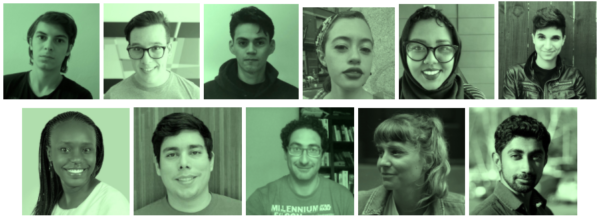
The 2017 Ford-Mozilla Open Web Fellows
Ford-Mozilla Open Web Fellows are talented technologists who are passionate about privacy, security, and net neutrality. Fellows embed with international NGOs for 10 months to work on independent research and project development.
Past Open Web Fellows have helped build open-source whistle-blowing software, and analyzed discriminatory police practice data.
Our third cohort of Open Web Fellows was selected from more than 300 applications. Our 11 2017 Fellows and host organizations are:
Sarah Aoun | Hollaback!
Carlos Guerra | Derechos Digitales
Sarah Kiden | Research ICT Africa
Bram Abramson | Citizen Lab
Freddy Martinez | Freedom of the Press Foundation
Rishab Nithyanand | Data & Society
Rebecca Ricks | Human Rights Watch
Aleksandar Todorović | Bits of Freedom
Maya Wagoner | Brooklyn Public Library
Orlando Del Aguila | Majal
Nasma Ahmed | MPower Change
Learn more about our Open Web Fellows.
<Meet our Mozilla Fellows in Science>
Mozilla’s Open Science Fellows work at the intersection of research and openness. They foster the use of open data and open source software in the scientific community, and receive training and support from Mozilla to hone their skills around open source, participatory learning, and data sharing.
Past Open Science fellows have developed online curriculum to teach the command line and scripting languages to bioinformaticians. They’ve defined statistical programming best-practices for instructors and open science peers. And they’ve coordinated conferences on the principles of working open.
Our third cohort of Open Science Fellows — supported by the Siegel Family Endowment — was selected from a record pool of 1,090 applications. Our two 2017 fellows are:
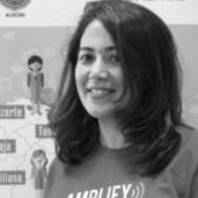 Amel Ghouila
Amel Ghouila
A computer scientist by background, Amel earned her PhD in Bioinformatics and is currently a bioinformatician at Institut Pasteur de Tunis. She works on the frame of the pan-African bioinformatics network H3ABionet, supporting researchers and their projects while developing bioinformatics capacity throughout Africa. Amel is passionate about knowledge transfer and working open to foster collaborations and innovation in the biomedical research field. She is also passionate about empowering and educating young girls — she launched the Technovation Challenge Tunisian chapter to help Tunisian girls learn how to address community challenges by designing mobile applications.
Follow Amel on Twitter and Github.
 Chris Hartgerink
Chris Hartgerink
Chris is an applied statistics PhD-candidate at Tilburg University, as part of the Metaresearch group. He has contributed to open science projects such as the Reproducibility Project: Psychology. He develops open-source software for scientists. And he conducts research on detecting data fabrication in science. Chris is particularly interested in how the scholarly system can be adapted to become a sustainable, healthy environment with permissive use of content, instead of a perverse system that promotes unreliable science. He initiated Liberate Science to work towards such a system.
Follow Chris on Twitter and Github.
Learn more about our Open Science Fellows.
<Meet our Mozilla Fellows in Media>
This year’s Mozilla Fellows cohort will also be joined by media producers. These makers and activists have created public education and engagement work that explores topics related to privacy and security. Their work incites curiosity and inspires action, and over their fellowship year will work closely with the Mozilla fellows cohort to understand and explain the most urgent issues facing the open Internet. Through a partnership with the Open Society Foundation, these fellows join other makers who have benefited from Mozilla’s first grants to media makers. Our two 2017 fellows are:
 Hang Do Thi Duc
Hang Do Thi Duc
Hang Do Thi Duc is a media maker whose artistic work is about the social web and the effect of data-driven technologies on identity, privacy, and society. As a German Fulbright and DAAD scholar, Hang received an MFA in Design and Technology at Parsons in New York City. She most recently created Data Selfie, a browser extension that aims to provide users with a personal perspective on data mining and predictive analytics through their Facebook consumption.
 Joana Varon
Joana Varon
Joana is Executive Directress and Creative Chaos Catalyst at Coding Rights, a women-run organization working to expose and redress the power imbalances built into technology and its application. Coding Rights focuses on imbalances that reinforce gender and North/South inequalities.
Meet more Mozilla fellows. The Mozilla Tech Policy Fellowship, launched in June 2017, brings together tech policy experts from around the world. Tech Policy Fellows participate in policy efforts to improve the health of the Internet. Find more details about the fellowship and individuals involved. Learn more about the Tech Policy Fellows.
The post Mozilla Announces 15 New Fellows for Science, Advocacy, and Media appeared first on The Mozilla Blog.
A Copyright Vote That Could Change the EU’s Internet
On October 10, the European Parliament Committee on Legal Affairs (JURI) will vote on a proposal to change EU copyright law.
The outcome could sabotage freedom and openness online. It could make filtering and blocking online content far more routine, affecting the hundreds of millions of EU citizens who use the internet everyday.
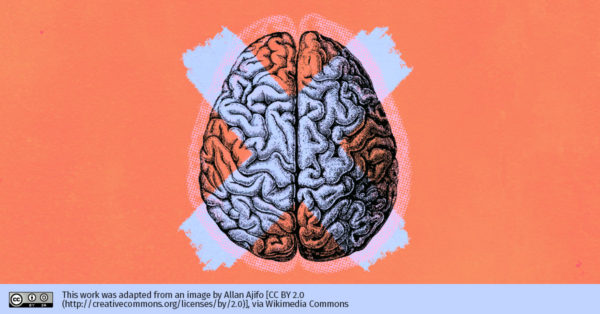
Dysfunctional copyright reform is threatening Europe’s internet
Why Copyright Reform MattersThe EU’s current copyright legal framework is woefully outdated. It’s a framework created when the postcard, and not the iPhone, was a reigning communication method.
But the EU’s proposal to reform this framework is in many ways a step backward. Titled “Directive on Copyright in the Digital Single Market,” this backward proposal is up for an initial vote on October 10 and a final vote in December.
“Many aspects of the proposal and some amendments put forward in the Parliament are dysfunctional and borderline absurd,” says Raegan MacDonald, Mozilla’s Senior EU Policy Manager. “The proposal would make filtering and blocking of online content the norm, effectively undermining innovation, competition and freedom of expression.”
Under the proposal:
- If the most dangerous amendments pass, everything you put on the internet will be filtered, and even blocked. It doesn’t even need to be commercial — some proposals are so broad that even photos you upload for friends and family would be included.
- Linking to and accessing information online is also at stake: extending copyright to cover news snippets will restrict our ability to learn from a diverse selection of sources. Sharing and accessing news online would become more difficult through the so-called “neighbouring right” for press publishers.
- The proposal would remove crucial protections for intermediaries, and would force most online platforms to monitor all content you post — like Wikipedia, eBay, software repositories on Github, or DeviantArt submissions.
- Only scientific research institutions would be allowed to mine text and datasets. This means countless other beneficiaries — including librarians, journalists, advocacy groups, and independent scientists — would not be able to make use of mining software to understand large data sets, putting Europe in a competitive disadvantage in the world.
In the weeks before the vote, Mozilla is urging EU citizens to phone their lawmakers and demand better reform. Our website and call tool — changecopyright.org — makes it simple to contact Members of European Parliament (MEPs).
This isn’t the first time Mozilla has demanded common-sense copyright reform for the internet age. Earlier this year, Mozilla and more than 100,000 EU citizens dropped tens of millions of digital flyers on European landmarks in protest. And in 2016, we collected more than 100,000 signatures calling for reform.
Well-balanced, flexible, and creativity-friendly copyright reform is essential to a healthy internet. Agree? Visit changecopyright.org and take a stand.
The post A Copyright Vote That Could Change the EU’s Internet appeared first on The Mozilla Blog.
Mozilla and the Washington Post Are Reinventing Online Comments
Digital journalism has revolutionized how we engage with the news, from the lightning speed at which it’s delivered to different formats on offer.
But the comments section beneath that journalism? It’s… broken. Trolls, harassment, enmity and abuse undermine meaningful discussion and push many people away. Many major newsrooms are removing their comments. Many new sites are launching without them.
Instead, newsrooms are directing interaction and engagement to social media. As a result, tools are limited, giant corporations control the data, and news organizations cannot build a direct relationship with their audience.
At Mozilla, we’re not giving up on online comments. We believe that engaging readers and building community around the news strengthens not just journalism, but also open society. We believe comments are a fundamental part of the decentralized web.
Mozilla has been researching, testing, and building software in this area since 2015. Today, our work is taking a huge step forward as the Washington Post integrates Talk — Mozilla’s open-source commenting platform — across washingtonpost.com.
Talk is currently deployed across the Washington Post’s Politics, Business, and The Switch (technology) sections, and will roll out to more sections in the coming weeks.
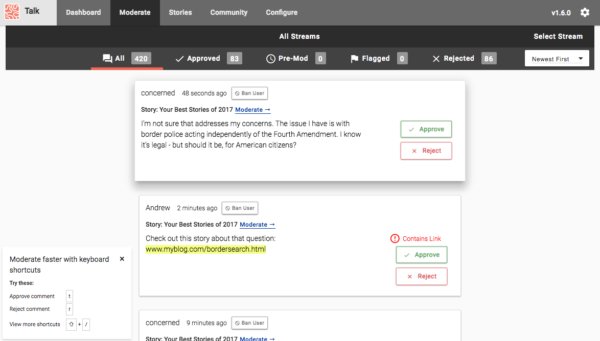
Talk is open-source commenting software developed by Mozilla.
What is Talk?Talk is developed by The Coral Project, a Mozilla creation that builds open-source tools to make digital journalism more inclusive and more engaging, both for audience members and journalists. Starting this summer, Talk will also be integrated across Fairfax Media’s websites in Australia, including the Sydney Morning Herald and The Age. One of The Coral Project’s other tools, Ask, is currently being used by 13 newsrooms, including the Miami Herald, Univision, and PBS Frontline.
“Trust in journalism relies on building effective relationships with your audience,” says Andrew Losowsky, project lead of The Coral Project. “Talk rethinks how moderation, comment display and conversation can function on news websites. It encourages more meaningful interactions between journalists and the people they serve.”
“Talk is informed by a huge amount of research into online communities,” Losowsky adds. “We’ve commissioned academic studies and held workshops around the world to find out what works, and also published guides to help newsrooms change their strategies. We’ve interviewed more than 300 people from 150 newsrooms in 30 countries, talking to frequent commenters, people who never comment, and even trolls. We’ve learned how to turn comments — which have so much potential — into a productive space for everyone.”
“Commenters and comment viewers are among the most loyal readers The Washington Post has,” said Greg Barber, The Post’s director of newsroom product. “Through our work with Mozilla, The New York Times, and the Knight Foundation in The Coral Project, we’ve invested in a set of tools that will help us better serve them, powering fruitful discussion and debate for years to come.”
The Coral Project was created thanks to a generous grant from the Knight Foundation and is currently funded by the Democracy Fund, the Rita Allen Foundation, and Mozilla. It also offers hosting and consulting services for newsrooms who need support in running their software.
Here’s what makes Talk differentIt’s filled with features that improve interactions, including functions that show the best comments first, ignore specific users, find great commenters, give badges to staff members, filter out unreliable flaggers, and offer a range of audience reactions.
You own your data. Unlike the most popular systems, every organization using Talk runs its own version of the software, and keeps its own data. Talk doesn’t contain any tracking, or digital surveillance. This is great for journalistic integrity, good for privacy, and important for the internet.
It’s fast. Talk is small — about 300kb — and lightweight. Only a small number of comments initially load, to keep the page load low. New comments and reactions update instantaneously.
It’s flexible. Talk uses a plugin architecture, so each newsroom can make their comments act in a different way. Plugins can be written by third parties — the Washington Post has already written and open sourced several — and applied within the embed code, in order to change the functionality for particularly difficult topics.
It’s easy to moderate. Based on feedback from moderators at 12 different companies, we’ve created a simple moderation system with keyboard shortcuts and a feature-rich configuration.
It’s great for technologists. Talk is fully extensible with a RESTful and Graph API, and a plugin architecture that includes webhooks. The CSS is also fully customizable.
It’s 100% free. The code is public and available for you to download and run. And if you want us to help you host or integrate Talk into your site, we offer paid services that support the project.
Learn more about The Coral Project.
The post Mozilla and the Washington Post Are Reinventing Online Comments appeared first on The Mozilla Blog.
Statement on U.S. DACA Program
We believe that the young people who would benefit from the Deferred Action for Childhood Arrivals (DACA) deserve the opportunity to take their full and rightful place in the U.S. The possible changes to the DACA that were recently reported would remove all benefits and force people out of the U.S. – that is simply unacceptable.
Removing DREAMers from classrooms, universities, internships and workforces threaten to put the very innovation that fuels our technology sector at risk. Just as we said with previous Executive Orders on Immigration, the freedom for ideas and innovation to flow across borders is something we strongly believe in as a tech company. More importantly it is something we know is necessary to fulfill our mission to protect and advance the internet as a global public resource that is open and accessible to all.
We can’t allow talent to be pushed out or forced into hiding. We also shouldn’t stand by and allow families to be torn apart. More importantly, as employers, industry leaders and Americans — we have a moral obligation to protect these children from ill-willed policies and practices. Our future depends on it.
We want DREAMers to continue contributing to this country’s future and we do not want people to live in fear. We urge the Administration to keep the DACA program intact. At the same time, we urge leaders in government to enact a bipartisan permanent solution, one that will allow these bright minds to prosper in the country we know and love.
The post Statement on U.S. DACA Program appeared first on The Mozilla Blog.
A ₹1 Crore Fund to Support Open Source Projects in India
Today Mozilla is announcing the launch of “Global Mission Partners: India”, an award program specifically focused on supporting open source and free software. The new initiative builds on the existing “Mission Partners” program. Applicants based in India can apply for funding to support any open source/free software projects which significantly further Mozilla’s mission.
Our mission, as embodied in our Manifesto, is to ensure the Internet is a global public resource, open and accessible to all; an Internet that truly puts people first, where individuals can shape their own experience and are empowered, safe and independent.
We know that many other software projects around the world, and particularly in India, share the goals of a free and open Internet with us, and we want to use our resources to help and encourage others to work towards this end.
If you are based in India and you think your project qualifies, Mozilla encourages you to apply. You can find the complete guidelines about this exciting award program on Mozilla’s wiki page.
The minimum award for a single application to the “Global Mission Partners: India” initiative is ₹1,25,000, and the maximum is ₹50,00,000.
The deadline for applications for the initial batch of “Global Mission Partners: India” is the last day of September 2017, at midnight Indian Time. Organizations can apply beginning today, in English or Hindi.
You can find a version of this post in Hindi here.
The post A ₹1 Crore Fund to Support Open Source Projects in India appeared first on The Mozilla Blog.
The Battle to Save Net Neutrality: A Panel with Tom Wheeler, Ro Khanna, Mozilla, Leading TV Producers and Others
Net neutrality — and the future of a healthy internet — is at stake.
In May, the FCC voted to move forward with plans to gut net neutrality. It was a decision met with furor: Since then, many millions of Americans have written, phoned and petitioned the FCC, demanding an internet that belongs to individual users, not broadband ISP gatekeepers. And scores of nonprofits and technology companies have organized to amplify Americans’ voices.
The first net neutrality public comment period ends on August 30, and the FCC is moving closer to a vote.
So on Monday, September 18, Mozilla is gathering leaders at the forefront of protecting net neutrality. We’ll discuss why it matters, what lies ahead, and what can be done to protect it.
RSVP: The Battle to Save Net Neutrality
Leaders like former FCC Chairman Tom Wheeler and Congressman Ro Khanna will discuss net neutrality’s importance to free speech, innovation, competition and social justice.
This free public event, titled “Battle to Save Net Neutrality,” will feature a panel discussion, reception and audience Q&A. It will be held at the Internet Archive (300 Funston Avenue, San Francisco) from 6 p.m. to 9 p.m. Participants include:
- Panelist Tom Wheeler, former FCC Chairman who served under President Obama and architect of the 2015 net neutrality rules
- Panelist and Congressman Ro Khanna (D-California), who represents California’s 17th congressional district in the heart of Silicon Valley. Khanna is a vocal supporter of net neutrality
- Panelist Amy Aniobi, TV writer and producer for “Insecure” (HBO) and “Silicon Valley” (HBO), and member of the Writers Guild of America, West
- Panelist Luisa Leschin, TV writer and producer for “From Dusk til Dawn” (Netflix) and “Just Add Magic” (Amazon), and a member of the Writers Guild of America, West
- Panelist Denelle Dixon, Mozilla Chief Legal and Business Officer. Dixon spearheads Mozilla’s business, policy and legal activities in defense of a healthy internet. She is a vocal advocate for net neutrality, encryption and greater user choice and control online
- Panelist Malkia Cyril, Executive Director of the Center for Media Justice. Cyril has spent the past 20 years building the capacity of racial and economic justice movements to win media rights, access and power in the digital age
- Moderator Gigi Sohn, Mozilla Tech Policy Fellow and former counselor to FCC Chairman Tom Wheeler (2013-2016). One of the nation’s leading advocates for an open, fair, and fast internet, Sohn was named “one of the heroes that saved the Internet” by The Daily Dot for her leadership in the passage of the FCC’s strong net neutrality rules in 2015
Join us as we discuss the future of net neutrality, and what it means for the health of the internet. Register for this free event here.
The post The Battle to Save Net Neutrality: A Panel with Tom Wheeler, Ro Khanna, Mozilla, Leading TV Producers and Others appeared first on The Mozilla Blog.
Welcome Michael DeAngelo, Chief People Officer
Michael DeAngelo joins the Mozilla leadership team this week as Chief People Officer.
As Chief People Officer, Michael is responsible for all aspects of HR and Organizational Development at Mozilla Corporation with an overall focus on ensuring we’re building and growing a resilient, high impact global organization as a foundation for our next decade of growth and impact.
Michael brings two decades of experience leading people teams at Pinterest, Google and Pepsico. Earlier in his career Michael held a number of HR roles in Organization Development, Compensation, and People Operations at Microsoft, Merck and AlliedSignal.
At Pinterest, Michael built out the majority of the HR function. One of the most important teams was the Diversity and Inclusion function which is recognized as one of the best in the industry. Two of his proudest moments there were being the first company ever to set public diversity goals. and growing new hires from under-represented backgrounds from 1% to 9% in one year.
Michael brings a global perspective from his tenure at Google, where for four years he led HR for the Europe/Middle East/Africa region based in Zurich, Switzerland. At Google he also led the HR team supporting 10,000 employees for Search, Android, Chrome, and Google+. Prior to Google, Michael was Vice President of HR at Pepsico leading all people functions for the Quaker Foods global P&L.
“Having spent so much of my career in technology, I have long been an admirer of Mozilla and the important contributions it has made to keeping the Internet open and accessible to all. This is an exciting time for Mozilla as we’re about to deliver a completely revitalized Firefox, we’re ramping investments in new emerging technologies and we’re making important strides in fighting for a healthier Internet platform for all. I am excited to come on board and support the continued development and growth of the organization’s talent and capabilities to help us reach our goals.”
Michael will be based in the Bay Area and will work primarily out of our San Francisco office.
Welcome Michael!
chris
The post Welcome Michael DeAngelo, Chief People Officer appeared first on The Mozilla Blog.
Honoring Our Friend Bassel: Announcing the Bassel Khartabil Free Culture Fellowship
By Katherine Maher (executive director, Wikimedia Foundation), Ryan Merkley (CEO, Creative Commons) and Mark Surman (executive director, Mozilla)
On August 1, 2017, we received the heartbreaking news that our friend Bassel (Safadi) Khartabil, detained since 2012, was executed by the Syrian government shortly after his 2015 disappearance. Khartabil was a Palestinian Syrian open internet activist, a free culture hero, and an important member of our community. Our thoughts are with Bassel’s family, now and always.
Today we’re announcing the Bassel Khartabil Free Culture Fellowship to honor his legacy and lasting impact on the open web.
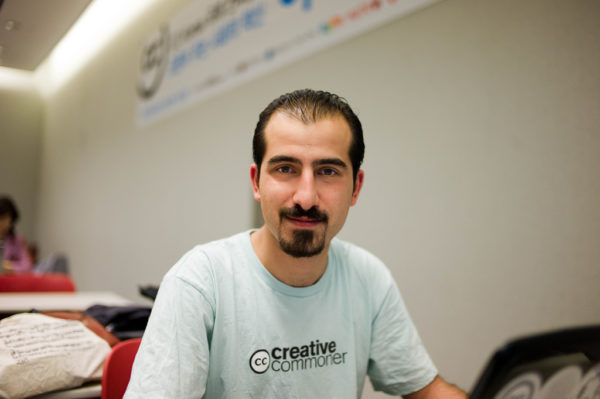
Bassel Khartabil
Bassel was a relentless advocate for free speech, free culture, and democracy. He was the cofounder of Syria’s first hackerspace, Aiki Lab, Creative Commons’ Syrian project lead, and a prolific open source contributor, from Firefox to Wikipedia. Bassel’s final project, relaunched as #NEWPALMYRA, entailed building free and open 3D models of the ancient Syrian city of Palmyra. In his work as a computer engineer, educator, artist, musician, cultural heritage researcher, and thought leader, Bassel modeled a more open world, impacting lives globally.
To honor that legacy, the Bassel Khartabil Free Culture Fellowship will support outstanding individuals developing the culture of their communities under adverse circumstances. The Fellowship — organized by Creative Commons, Mozilla, the Wikimedia Foundation, the Jimmy Wales Foundation, #NEWPALMAYRA, and others — will launch with a three-year commitment to promote values like open culture, radical sharing, free knowledge, remix, collaboration, courage, optimism, and humanity.
As part of this new initiative, fellows can work in a range of mediums, from art and music to software and community building. All projects will catalyze free culture, particularly in societies vulnerable to attacks on freedom of expression and free access to knowledge. Special consideration will be given to applicants operating within closed societies and in developing economies where other forms of support are scarce. Applications from the Levant and wider MENA region are greatly encouraged.
Throughout their fellowship term, chosen fellows will receive a stipend, mentorship from affiliate organizations, skill development, project promotion, and fundraising support from the partner network. Fellows will be chosen by a selection committee composed of representatives of the partner organizations.
Says Mitchell Baker, Mozilla executive chairwoman: “Bassel introduced me to Damascus communities who were hungry to learn, collaborate and share. He introduced me to the Creative Commons community which he helped found. He introduced me to the open source hacker space he founded, where Linux and Mozilla and JavaScript libraries were debated, and the ideas of open collaboration blossomed. Bassel taught us all. The cost was execution. As a colleague, Bassel is gone. As a leader and as a source of inspiration, Bassel remains strong. I am honored to join with others and echo Bassel’s spirit through this Fellowship.”
Fellowship detailsOrganizational Partners include Creative Commons, #FREEBASSEL, Wikimedia Foundation, GlobalVoices, Mozilla, #NEWPALMYRA, YallaStartup, the Jimmy Wales Foundation, and SMEX.
Amazon Web Services is a supporting partner.
The Fellowships are based on one-year terms, which are eligible for renewal.
The benefits are designed to allow for flexibility and stability both for Fellows and their families. The standard fellowship offers a stipend of $50,000 USD, paid in 10 monthly installments. Fellows are responsible for remitting all applicable taxes as required.
To help offset cost of living, the fellowship also provides supplements for childcare and health insurance, and may provide support for project funding on a case-by-case basis. The fellowship also covers the cost of required travel for fellowship activities.
Fellows will receive:
- A stipend of $50,000 USD, paid in 10 monthly installments
- A one-time health insurance supplement for Fellows and their families, ranging from $3,500 for single Fellows to $7,000 for a couple with two or more children
- A one-time childcare allotment of up to $6,000 for families with children
- An allowance of up to $3,000 towards the purchase of laptop computer, digital cameras, recorders and computer software; fees for continuing studies or other courses, research fees or payments, to the extent such purchases and fees are related to the fellowship
- Coverage in full for all approved fellowship trips, both domestic and international
The first fellowship will be awarded in April 2018. Applications will be accepted beginning February 2018.
Eligibility Requirements. The Bassel Khartabil Free Culture Fellowship is open to individuals and small teams worldwide, who:
- Propose a viable new initiative to advance free culture values as outlined in the call for applicants
- Demonstrate a history of activism in the Open Source, Open Access, Free Culture or Sharing communities
- Are prepared to focus on the fellowship as their primary work
Special consideration will be given to applicants operating under oppressive conditions, within closed societies, in developing economies where other forms of support are scarce, and in the Levant and wider MENA regions.
Eligible Projects. Proposed projects should advance the free culture values of Bassel Khartabil through the use of art, technology, and culture. Successful projects will aim to:
- Meaningfully increase free public access to human knowledge, art or culture
- Further the cause of social justice/social change
- Strive to develop both a local and global community to support its cause
Any code, content or other materials produced must be published and released as free, openly licensed and/or open-source.
Application Process. Project proposals are expected to include the following:
- Vision statement
- Bio and CV
- Budget and resource requirements for the next year of project development
Applicants whose projects are chosen to advance to the next stage in the evaluation process may be asked to provide additional information, including personal references and documentation verifying income.
About BasselBassel Khartabil, a Palestinian-Syrian computer engineer, educator, artist, musician, cultural heritage researcher and thought leader, was a central figure in the global free culture movement, connecting and promoting Syria’s emerging tech community as it existed before the country was ransacked by civil war. Bassel co-founded Syria’s first hackerspace, Aiki Lab, in Damascus in 2010. He was the Syrian lead for Creative Commons as well as a contributor to Mozilla’s Firefox browser and the Red Hat Fedora Linux operating system. His research into preserving Syrian archeology with computer 3D modeling was a seminal precursor to current practices in digital cultural heritage preservation — this work was relaunched as the #NEWPALMYRA project in 2015.
Bassel’s influence went beyond Syria. He was a key attendee at the Middle East’s bloggers conferences and played a vital role in the negotiations in Doha in 2010 that led to a common language for discussing fair use and copyright across the Arab-speaking world. Software platforms he developed, such as the open-source Aiki Framework for collaborative web development, still power high-traffic web sites today, including Open Clip Art and the Open Font Library. His passion and efforts inspired a new community of coders and artists to take up his cause and further his legacy, and resulted in the offer of a research position in MIT Media Lab’s Center for Civic Media; his listing in Foreign Policy’s 2012 list of Top Global Thinkers; and the award of Index on Censorship’s 2013 Digital Freedom Award.
Bassel was taken from the streets in March of 2012 in a military arrest and interrogated and tortured in secret in a facility controlled by Syria’s General Intelligence Directorate. After a worldwide campaign by international human rights groups, together with Bassel’s many colleagues in the open internet and free culture communities, he was moved to Adra’s civilian prison, where he was able to communicate with his family and friends. His detention was ruled unlawful by the United Nations Working Group on Arbitrary Detention, and condemned by international organizations such as Creative Commons, Amnesty International, Human Rights Watch, the Electronic Frontier Foundation, and the Jimmy Wales Foundation.
Despite the international outrage at his treatment and calls for his release, in October of 2015 he was moved to an undisclosed location and executed shortly thereafter — a fact that was kept secret by the Syrian regime for nearly two years.
The post Honoring Our Friend Bassel: Announcing the Bassel Khartabil Free Culture Fellowship appeared first on The Mozilla Blog.
The Mozilla Information Trust Initiative: Building a movement to fight misinformation online
Today, we are announcing the Mozilla Information Trust Initiative (MITI)—a comprehensive effort to keep the Internet credible and healthy. Mozilla is developing products, research, and communities to battle information pollution and so-called ‘fake news’ online. And we’re seeking partners and allies to help us do so.
Here’s why.

Imagine this: Two news articles are shared simultaneously online.
The first is a deeply reported and thoroughly fact checked story from a credible news-gathering organization. Perhaps Le Monde, the Wall Street Journal, or Süddeutsche Zeitung.
The second is a false or misleading story. But the article is designed to mimic content from a credible newsroom, from its headline to its dissemination.
How do the two articles fare?
The first article—designed to inform—receives limited attention. The second article—designed for virality—accumulates shares. It exploits cognitive bias, belief echos, and algorithmic filter bubbles. It percolates across the Internet, spreading misinformation.
This isn’t a hypothetical scenario—it’s happening now in the U.S., in the U.K., in France, in Germany, and beyond. The Pope did not endorse a U.S. presidential candidate, nor does India’s 2000-rupee note contain a tracking device. But fabricated content, misleading headlines, and false context convinced millions of Internet users otherwise.
The impact of misinformation on our society is one of the most divisive, fraught, and important topics of our day. Misinformation depletes transparency and sows discord, erodes participation and trust, and saps the web’s public benefit. In short: it makes the Internet less healthy. As a result, the Internet’s ability to power democratic society suffers greatly.
This is why we’re launching MITI. We’re investing in people, programs, and projects that disrupt misinformation online.
Why Mozilla? The spread of misinformation violates nearly every tenet of the Mozilla Manifesto, our guiding doctrine. Mozilla has a long history of putting community and principles first, and devoting resources to urgent issues—our Firefox browser is just one example. Mozilla is committed to building tolerance rather than hate, and building technology that can protect individuals and the web.
So we’re drawing on the unique depth and breadth of the Mozilla Network—from journalists and technologists to policymakers and scientists—to build functional products, research, and community-based solutions.
Misinformation is a complex problem with roots in technology, cognitive science, economics, and literacy. And so the Mozilla Information Trust Initiative will focus on four areas:
ProductMozilla’s Open Innovation team will work with like-minded technologists and artists to develop technology that combats misinformation.
Mozilla will partner with global media organizations to do this, and also double down on our existing product work in the space, like Pocket, Focus, and Coral. Coral is a Mozilla project that builds open-source tools to make digital journalism more inclusive and more engaging.
LiteracyWe can’t solve misinformation with technology alone—we also need to educate and empower Internet users, as well as those leading innovative literacy initiatives.
Mozilla will develop a web literacy curriculum that addresses misinformation, and will continue investing in existing projects like the Mission: Information teaching kit.
ResearchMisinformation in the digital age is a relatively new phenomenon. To solve such a thorny problem, we first need to fully understand it.
Later this year, Mozilla will be releasing original research on how misinformation impacts users’ experiences online. We will be drawing on a dataset of user-level browsing data gathered during the 2016 U.S. elections.
Creative interventionsMozilla will field and fund pitches from technologists who are combatting misinformation using various mediums, including virtual reality and augmented reality. It’s an opportunity to apply emerging technology to one of today’s most pressing issues.
Imagine: an augmented reality web app that uses data visualization to investigate misinformation’s impact on Internet health. Or, a virtual reality experience that takes users through the history of misinformation online.
Mozilla will also support key events in this space, like Media Party Argentina, the Computation+Journalism Symposium, the Online News Association, the 22×20 summit, and a MisinfoCon in London as part of MozFest. (To learn more about MozFest — Mozilla’s annual, flagship event devoted to Internet health — visit mozillafestival.org.)
We’re hoping to hear from and work with partners who share our vision. Please reach out to Phillip Smith, Mozilla’s Senior Fellow on Media, Misinformation & Trust, at miti@mozilla.com to get involved.
More than ever, we need a network of people and organizations devoted to understanding, and combatting, misinformation online. The health of the Internet — and our societies — depends on it.
The post The Mozilla Information Trust Initiative: Building a movement to fight misinformation online appeared first on The Mozilla Blog.
Firefox Is Better, For You. WebVR and new speedy features launching today in Firefox
Perhaps you’re starting to see a pattern – we’re working furiously to make Firefox faster and better than ever. And today we’re shipping a new release that’s our best yet, one that introduces exciting, empowering new technologies for creators as well as improves the everyday experience for all Firefox users.
Here’s what’s new today:
WebVR opens up a whole new world for the WWWOn top of Firefox’s new super-fast multi-process foundation, today we’re launching a breakthrough feature that expands the web to an entirely new experience. Firefox for Windows is the first desktop browser to support WebVR for all users, letting you experience next-generation entertainment in virtual reality.
WebVR enables developers and artists to create web-based VR experiences you can browse to with Firefox. So whether you’re a current Oculus Rift or HTC Vive owner – or still deciding when you’re going to take the VR leap – Firefox can get you to your VR fix faster. Once you find a web game or app that supports VR, you can experience it with your headset just by clicking the VR goggles icon visible on the web page. You can navigate and control VR experiences with handset controllers and your movements in physical space.
For a look at what WebVR can do, check out this sizzle reel (retro intro intended!).
If you’re ready to try out VR with Firefox, a growing community of creators has already been building content with WebVR. Visit vr.mozilla.org to find some experiences we recommend, many made with A-Frame, an easy-to-use WebVR content creation framework made by Mozilla.. One of our favorites is A Painter, a VR painting experience. None of this would have been possible without the hard work of the Mozilla VR team, who collaborated with industry partners, fellow browser makers and the developer community to create and adopt the WebVR specification. If you’d like to learn more about the history and capabilities of WebVR, check out this Medium post by Sean White.
Performance Panel – fine-tune browser performanceOur new multi-process architecture allows Firefox to easily handle complex websites, particularly when you have many of them loaded in tabs. We believe we’ve struck a good balance for most computers, but for those of you who are tinkerers, you can now adjust the number of processes up or down in this version of Firefox. This setting is at the bottom of the General section in Options.
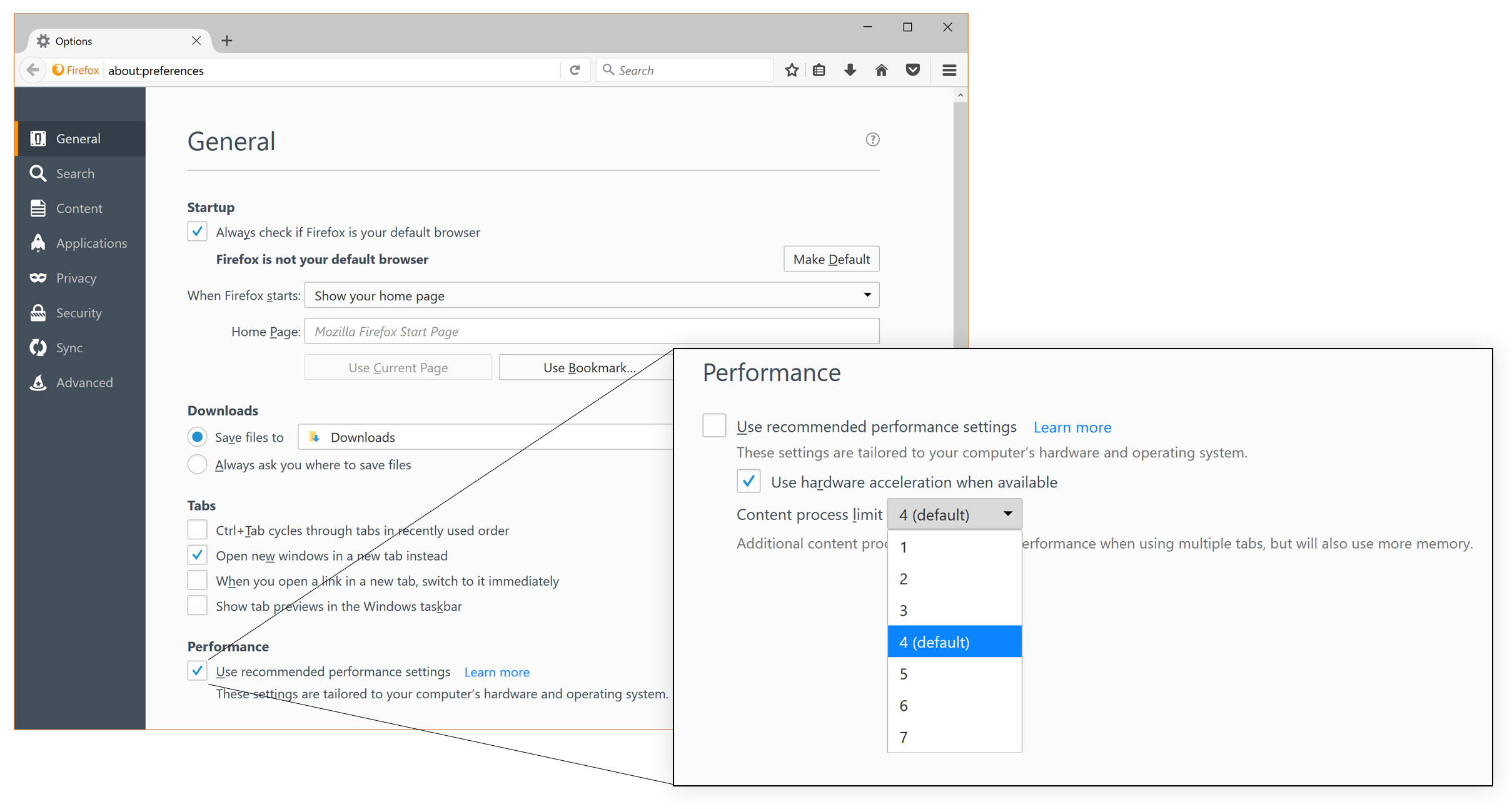 Tip: if your computer has lots of RAM (e.g., more than 8GB), you might want to try bumping up the number of content processes that Firefox uses from its default four. This can make Firefox even faster, although it will use more memory than it does with four processes. But, in our tests on Windows 10, Firefox uses less memory than Chrome, even with eight content processes running.
Tip: if your computer has lots of RAM (e.g., more than 8GB), you might want to try bumping up the number of content processes that Firefox uses from its default four. This can make Firefox even faster, although it will use more memory than it does with four processes. But, in our tests on Windows 10, Firefox uses less memory than Chrome, even with eight content processes running.
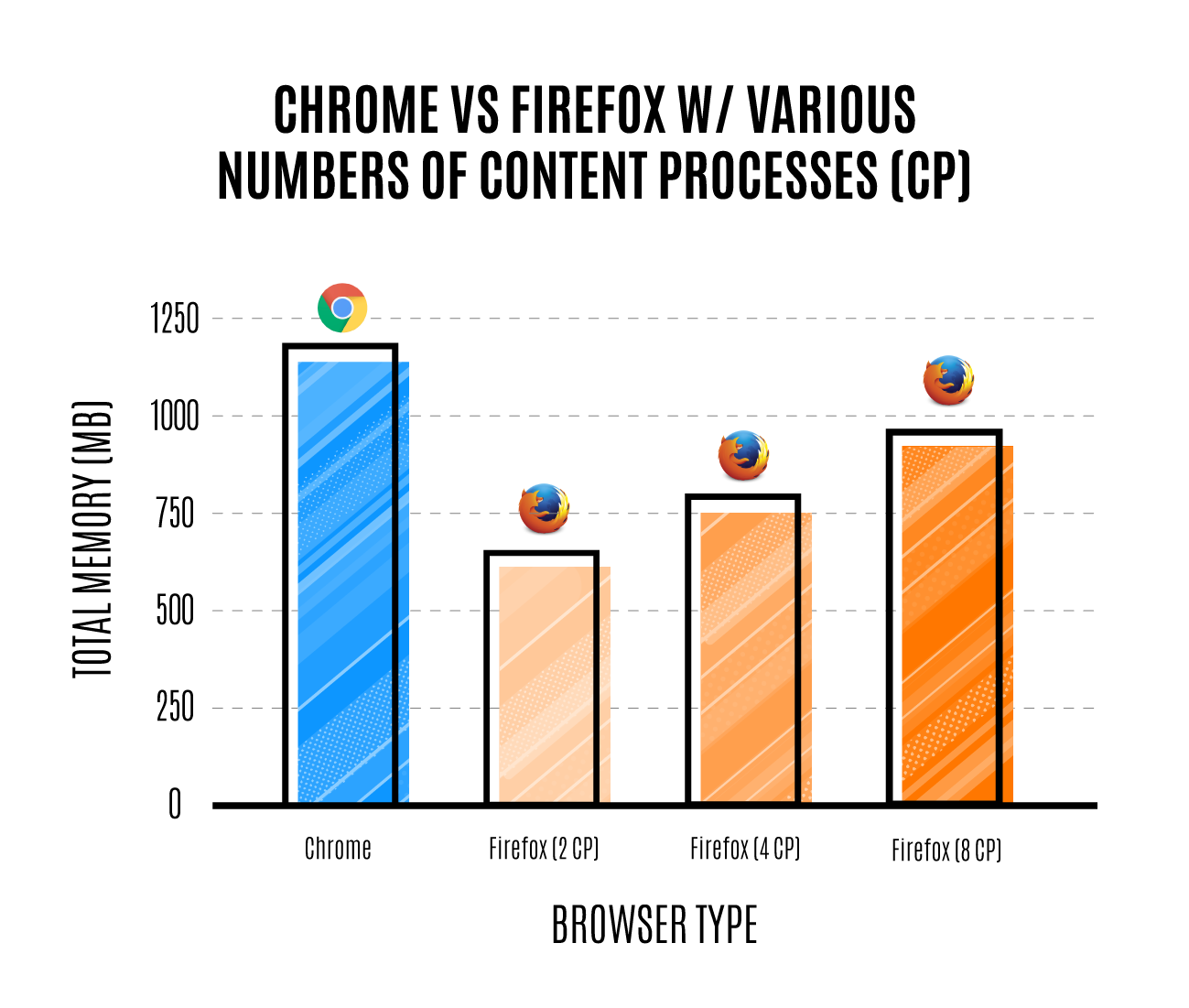 Faster startup when restoring lots of tabs
Faster startup when restoring lots of tabs
Are you a tab hoarder? As part of our Quantum Flow project to improve performance, we’ve significantly reduced the time it takes to start Firefox when restoring tabs from a previous session. Just how much faster are things now? Mozillian Dietrich Ayala ran an interesting experiment, comparing how long it takes to start various versions of Firefox with a whopping 1,691 tabs open. The end result? What used to take nearly eight minutes, now takes just 15 seconds.
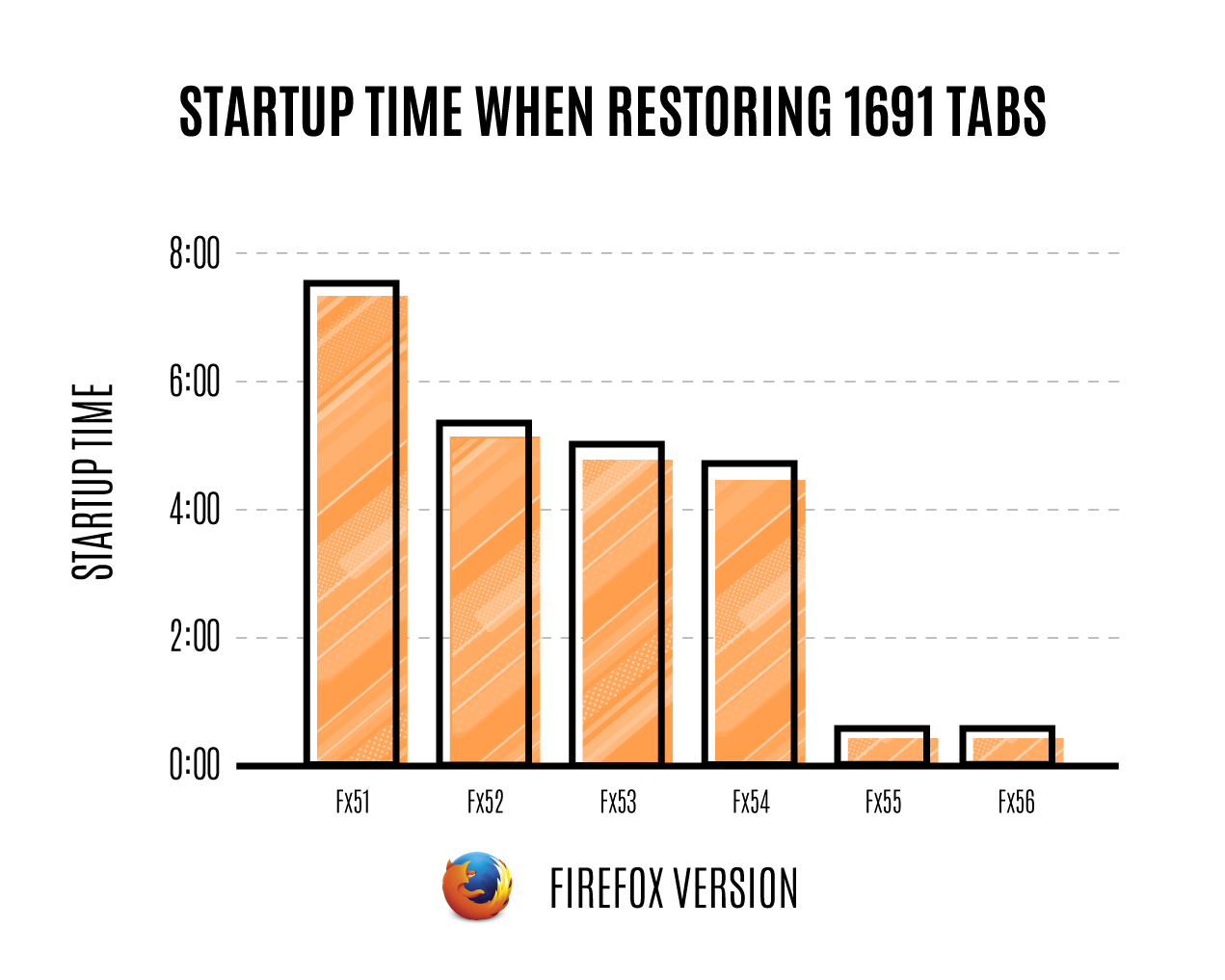 A faster and more stable Firefox for 64-bit Windows
A faster and more stable Firefox for 64-bit Windows
If you’re running the 64-bit version of Windows (here’s how to check), you might want to download and reinstall Firefox today. That’s because new downloads on 64-bit Windows will install the 64-bit version of Firefox, which is much less prone to running out of memory and crashing. In our tests so far, the 64-bit version of Firefox reduces crashes by 39% on machines with 4GB of RAM.
If you don’t manually upgrade, no worries. We intend to automatically migrate 64-bit Windows users to 64-bit Firefox in our next release.
A faster way to searchWe’re all searching for something. Sometimes that thing is a bit of information – like a fact you can glean from Wikipedia. Or, maybe it’s a product you hope to find on Amazon, or a video on YouTube.
With today’s Firefox release, you can quickly search using many websites’ search engines, right from the address bar. Just type your query, and then click which search engine you’d like to use.
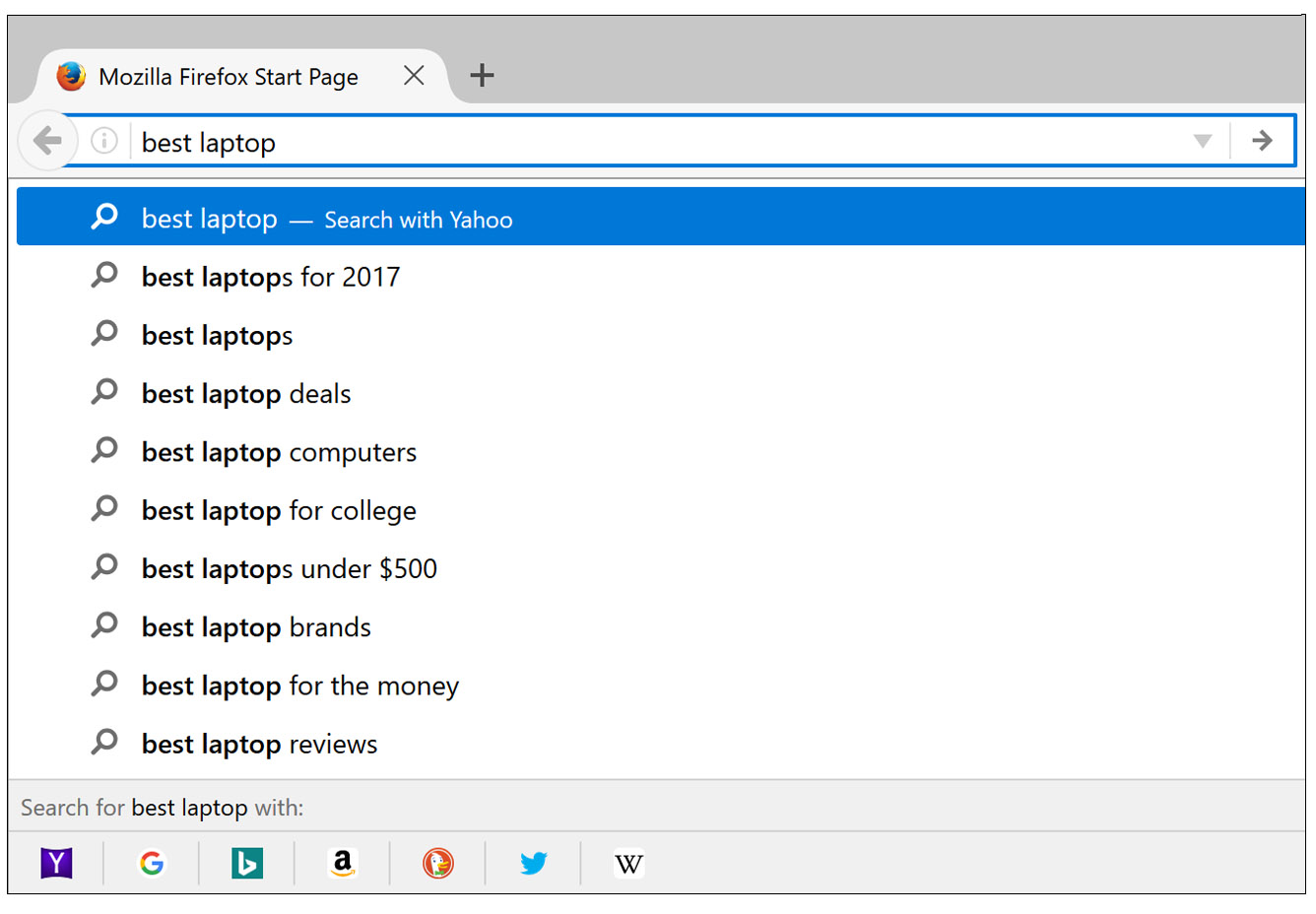 Out of the box, you can easily search with Yahoo, Google, Bing, Amazon, DuckDuckGo, Twitter, and Wikipedia. You can customize this list of search engines in settings.
Out of the box, you can easily search with Yahoo, Google, Bing, Amazon, DuckDuckGo, Twitter, and Wikipedia. You can customize this list of search engines in settings.
Here are a few more interesting improvements shipping today:
- Parts of a web page that use Flash must now be clicked and given permission to run. This improves battery life, security, and stability, and is a step towards Flash end-of-life.
- You can now move the sidebar to the right side of the window.
- Firefox for Android is now translated in Greek and Lao.
- Simplify print jobs from within print preview.
As usual, you can see everything new in the release notes, and developers can read about new APIs on the Mozilla Hacks Blog.
We’ll keep cranking away – much more to come!
- Download Firefox for Windows, Mac, Linux
- Release Notes for Firefox for Windows, Mac, Linux
- Download Firefox for Android
- Release Notes for Firefox for Android
The post Firefox Is Better, For You. WebVR and new speedy features launching today in Firefox appeared first on The Mozilla Blog.
New Test Pilot Experiments Available Today
It’s been a busy summer for Firefox! Last month, we delivered the first in a series of groundbreaking updates to the browser. This week, the Test Pilot team is continuing to evolve Firefox features with three new experiences that will make for a simpler, faster and safer experience.
SendSending files over the internet is something many of us do everyday. Mozilla makes it easy to keep your files safe. With Send, your files self-destruct after download, so they can’t be accessed by anyone else. Your files are encrypted during transmission. Plus, Send encrypts files on the client side, so that not even Mozilla can read them.
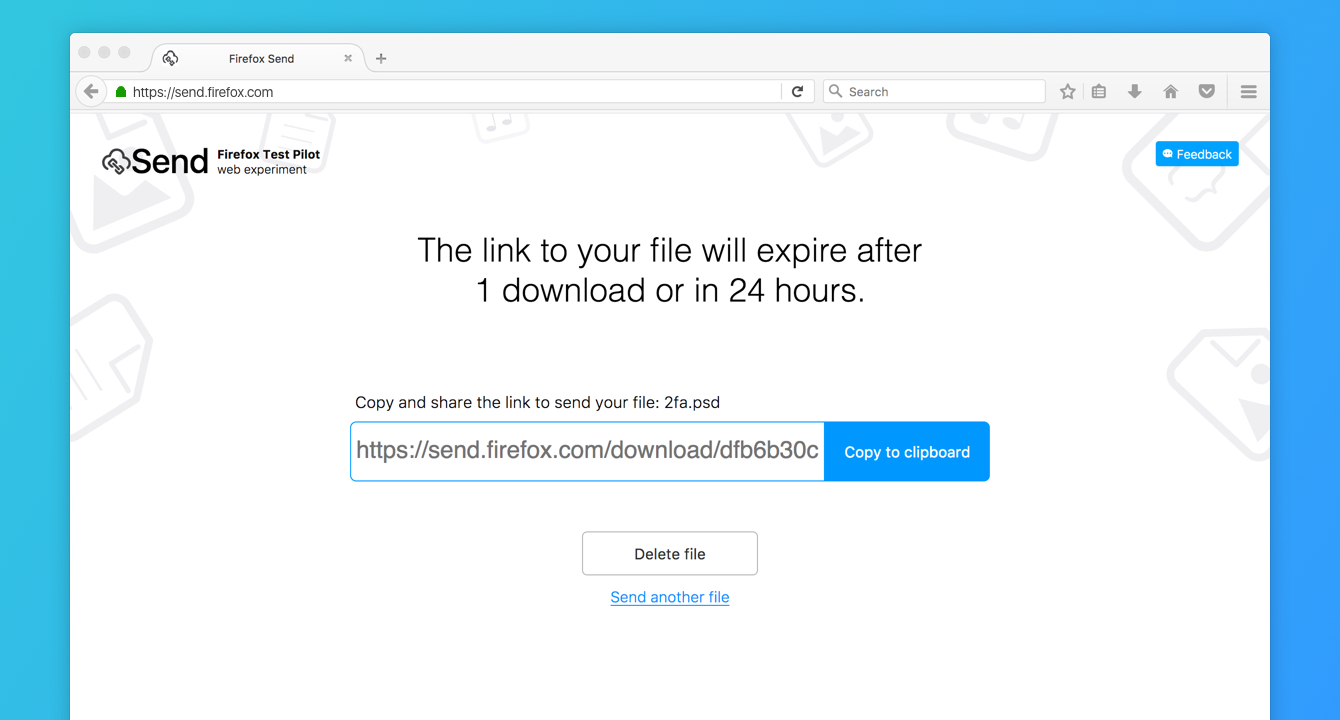
Mozilla is a champion of making the web open and accessible to everyone. With Voice Fill, we’re experimenting with support for Speech to Text (STT) functionality in Firefox, making it possible for users to input text in Firefox by voice. Your contributions to this experiment will help us optimize speech to text input so that we can expand support throughout Firefox.
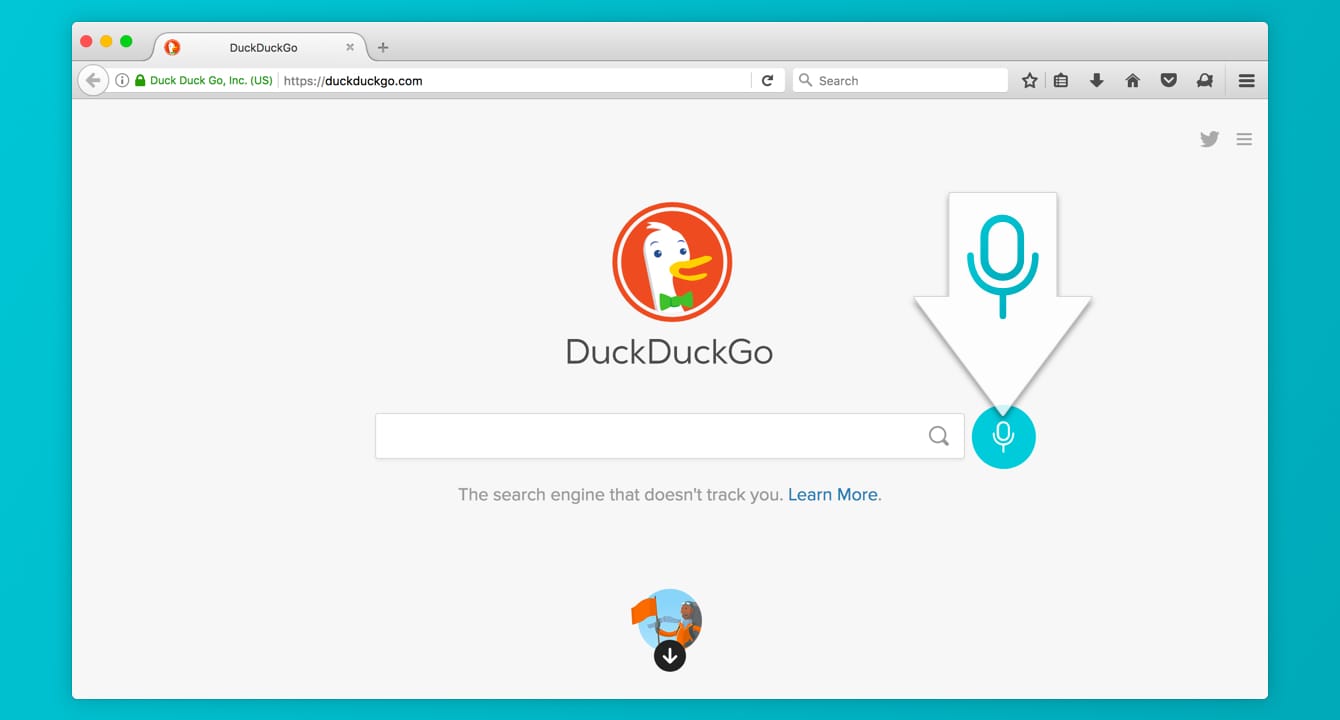
 Notes
Notes
Whether it’s a sticky note, an app or the back of an envelope, so many of us rely on jotting down quick notes to keep track of our busy lives. Notes is a simple, convenient place to take, store and retrieve notes – all within Firefox. We’re also working to build in support for Firefox Accounts, so you can sync your notes wherever you use Firefox
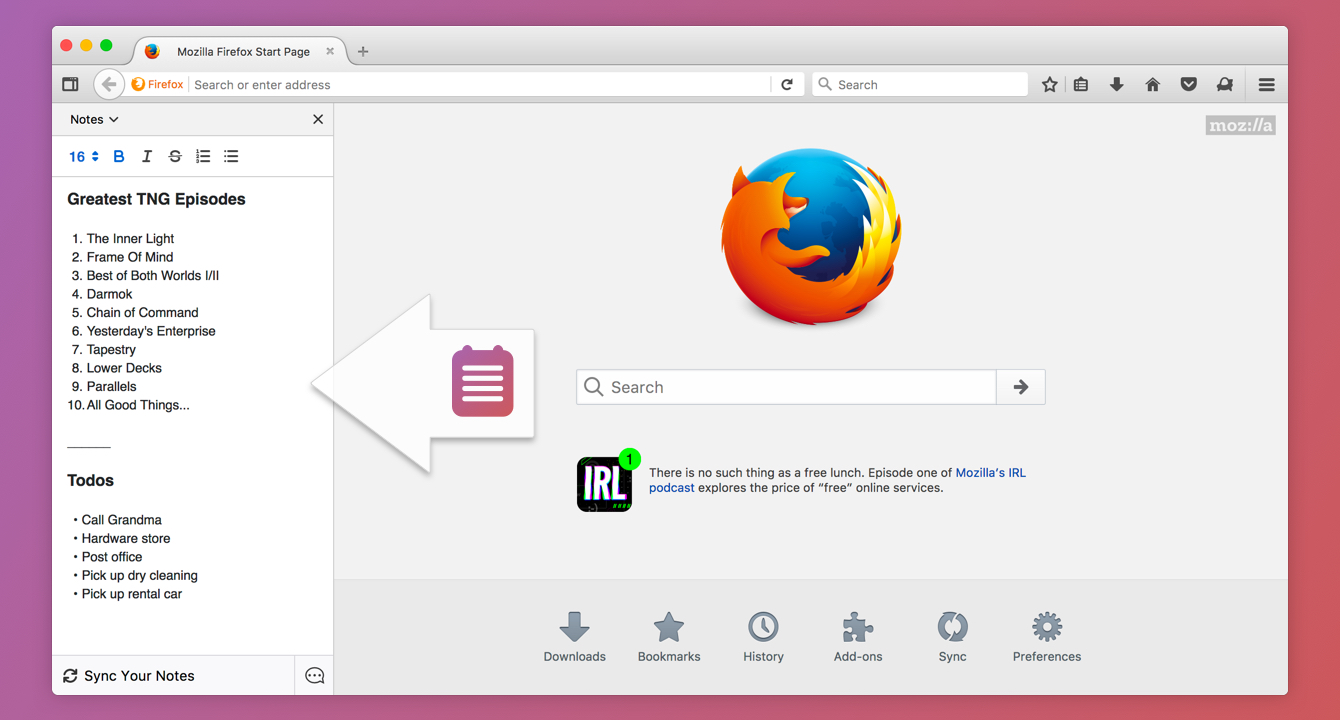
The Test Pilot program is open to all Firefox users and helps us test and evaluate a variety of potential Firefox features. To activate Test Pilot and help us build the future of Firefox, visit testpilot.firefox.com.
These Test Pilot experiments are available in English only. If you’ve experimented with Test Pilot features before, you know that you might run into some bugs or lose some of the polish in Firefox, so you can easily enable or disable features at any time.
We want your feedback! Try out these and other Test Pilot experiments and help us decide which new features to build into future versions of Firefox.
The post New Test Pilot Experiments Available Today appeared first on The Mozilla Blog.
Mozilla releases research results: Zero rating is not serving as an on-ramp to the internet
Can digital literacy and Equal Rating solutions help connect the unconnected?
Today, 4 billion people live without the internet. There’s a global debate about how to connect the unconnected, but it’s often dominated by assumptions and not a lot of data or talking to actual users on the ground.
To better inform this issue, Mozilla recently supported a series of focus groups to investigate how and why people use subsidized services in India, Myanmar, Peru, Kenya, Nigeria, Rwanda and South Africa. Today, we’re releasing the results of this research carried out by Research ICT Africa, LIRNEasia and IEP.

Credit: Peter Cihon
Why do we care?
Many companies and organizations are working to connect the unconnected. For us at Mozilla, it is our mission to ensure the internet is a global public resource that’s open and accessible to all.
We’ve focused our work in this space on a concept we call Equal Rating. Building on Mozilla’s strong commitment to net neutrality, Equal Rating models are free of discrimination, gatekeepers, and pay-to-play schemes. Equal Rating stands in contrast to zero rating business models, which reduce the cost to zero only for some sites and services. We’ve pursued this through policy engagement with governments, an innovation challenge to catalyze new thinking in providing affordable access, and this research.
What did we ask?
- What barriers are keeping people offline?
- Is zero rating serving as an on-ramp to the internet?
- Why and how do people use subsidized services?
- Do people move beyond subsidized services, or do they just stay in the subsidized walled garden?
- How does use of subsidized services affect future internet usage?
What did we find?
Zero rating is not serving as an on-ramp to the internet
In all countries surveyed — excluding India where zero rating has been banned by the regulator — focus groups revealed that users are not coming online through zero rated services. While more research is needed, if zero rating is not actually serving as an on-ramp to bring people online, the benefits seem low, while the resulting risk of these offerings creating an anti-competitive environment is extremely high.
People use zero rating as one of many cost saving strategies
This research revealed that people who use zero rated services usually also have full access to the internet, and make use of zero rated and subsidized data services as one of many money-saving strategies, including:
- Use of multiple SIM cards cards to take advantage of promotions, better reception quality, or better prices for a given service.
- Use of public Wi-Fi. For example, many buses in Rwanda now provide wifi access, and participants reported being willing to wait for a bus that was Wi-Fi-enabled.
- Tethering to mobile hotspots. In South Africa and India, users not only share data but also promotions and subsidized offers from one phone to another.
- Earned reward applications (where users download, use, or share a promoted application in return for mobile data/credit). The research indicates that most users tend to play the system to get the most credit possible and then abandon the earned reward application.
- While users, especially in the African studies, report skepticism about whether zero rated promotions are truly free, partially subsidized bundles are popular. Notably, many of these offerings are Equal Rating compliant.
Some, particularly rural and low income users, are trapped in walled gardens
While zero rated services tend to be only part of internet usage for most users studied, some users are getting trapped in the walled gardens of these subsidized offerings.
- In particular, low income respondents in Peru and Rwanda use zero rated content for much of their browsing activity, as do rural respondents in Myanmar.
- Awareness matters: in Myanmar, respondents who know they are in a zero rated walled garden (e.g., due to lack of photos and video) are more likely to access the full internet beyond the walled garden.
- But, when Facebook is subsidized without impacting user experience, users tend to concentrate their usage on that single site, demonstrating concerns around the anti-competitive effects of zero rating.
Digital illiteracy limits access for connected and unconnected alike
Infrastructure and affordability are commonly cited barriers to internet access around the world; yet, this research also points to a third important barrier: digital literacy.
- Users and non-users alike do not understand all that the internet can offer.
- Users generally restrict their internet use to a few large websites and services.
- A lack of understanding about the internet and internet-connected devices exacerbates misconceptions and spreads fear around privacy, security, and health, which in turn undermines use of the internet. One Kenyan respondent said of non-users: “there are some assumptions that they can get diseases transmitted to them like skin cancer through the use of the internet.”
Many companies and NGOs are already doing great work to advance digital literacy, but we need to scale up these efforts.
Competition, literacy, language, and gender are also barriers to internet access
This research highlighted a series of consistent and persistent barriers to access.
- While 95% of the world has access to an internet signal, far too often, users have access to only one, low quality provider, usually the most expensive option in their country.
- Without basic literacy, some respondents cannot access the internet. As one respondent in rural South Africa said, “if you cannot read or write you cannot use internet, many people in this community are not educated and I believe most of them want to be able to use internet because it makes life easier.”
- Others in Myanmar, Peru, and Rwanda cite the lack of local language content and tools as keeping them from coming online.
- Evidence of a gendered digital divide is seen throughout all of the countries studied, with some women afraid of “breaking the machine” while others say social stigma, domestic abuse, negative impressions, and housework obligations limit their use of the internet.
These are just some of the highlights and interesting findings. We have results from nearly 80 focus groups in these seven countries. For more detailed information, the country summaries and full reports are available here.
Next steps to bring the next 4 billion online
Mozilla supported this research to help better inform what we believe is a global imperative to bring the world’s 4 billion unconnected people online to access the full and open internet.
Based on these findings, we believe the internet needs:
- The development of more Equal Rating compliant models, many of which seemed to be quite popular with research respondents and provide access to the full diversity of the open internet, not just some parts of it.
- Further investment in digital literacy training, especially in schools, on devices, and in retail outlets. For more information about Mozilla’s digital literacy efforts, see our recent Digital Skills Observatory study.
- Work on all barriers to access to address infrastructure investment especially in rural areas, affordability, local content and local language tools, and gender equality.
Bringing the full internet to all people is one of the great challenges of our time. While we know there is more research needed, this research better informs the global debate on how to connect the unconnected, and makes clear the challenges ahead. We are committed to tackling these challenges but we know it will take all of us — tech companies, telecom companies, governments, civil society groups and philanthropists — working together to get everyone online.
We’d like to thank the researchers at Research ICT Africa, LIRNEasia, and IEP, as well as Jochai Ben-Avie (who manages all our Equal Rating work) and Peter Cihon (our awesome summer intern) who helped analyze this research.
The post Mozilla releases research results: Zero rating is not serving as an on-ramp to the internet appeared first on The Mozilla Blog.
How Could You Use a Speech Interface?
Last month in San Francisco, my colleagues at Mozilla took to the streets to collect samples of spoken English from passers-by. It was the kickoff of our Common Voice Project, an effort to build an open database of audio files that developers can use to train new speech-to-text (STT) applications.
What’s the big deal about speech recognition?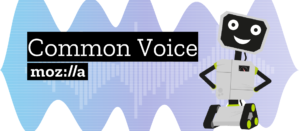
Speech is fast becoming a preferred way to interact with personal electronics like phones, computers, tablets and televisions. Anyone who’s ever had to type in a movie title using their TV’s remote control can attest to the convenience of a speech interface. According to one study, it’s three times faster to talk to your phone or computer than to type a search query into a screen interface.
Plus, the number of speech-enabled devices is increasing daily, as Google Home, Amazon Echo and Apple HomePod gain traction in the market. Speech is also finding its way into multi-modal interfaces, in-car assistants, smart watches, lightbulbs, bicycles and thermostats. So speech interfaces are handy — and fast becoming ubiquitous.
The good news is that a lot of technical advancements have happened in recent years, so it’s simpler than ever to create production-quality STT and text-to-speech (TTS) engines. Powerful tools like artificial intelligence and machine learning, combined with today’s more advanced speech algorithms, have changed our traditional approach to development. Programmers no longer need to build phoneme dictionaries or hand-design processing pipelines or custom components. Instead, speech engines can use deep learning techniques to handle varied speech patterns, accents and background noise – and deliver better-than-ever accuracy.
The Innovation PenaltyThere are barriers to open innovation, however. Today’s speech recognition technologies are largely tied up in a few companies that have invested heavily in them. Developers who want to implement STT on the web are working against a fractured set of APIs and support. Google Chrome supports an STT API that is different from the one Apple supports in Safari, which is different from Microsoft’s.
So if you want to create a speech interface for a web application that works across all browsers, you would need to write code that would work with each of the various browser APIs. Writing and then rewriting code to work with every browser isn’t feasible for many projects, especially if the code base is large or complex.
There is a second option: You can purchase access to a non-browser-based API from Google, IBM or Nuance. Fees for this can cost roughly one cent per invocation. If you go this route, then you get one stable API to write to. But at one cent per utterance, those fees can add up quickly, especially if your app is wildly popular and millions of people want to use it. This option has a success penalty built into it, so it’s not a solid foundation for any business that wants to grow and scale.
Opening Up Speech on the WebWe think now is a good time to try to open up the still-young field of speech technology, so more people can get involved, innovate, and compete with the larger players. To help with that, the Machine Learning team in Mozilla Research is working on an open source STT engine. That engine will give Mozilla the ability to support STT in our Firefox browser, and we plan to make it freely available to the speech developer community, with no access or usage fees.
Secondly, we want to rally other browser companies to support the Web Speech API, a W3C community group specification that can allow developers to write speech-driven interfaces that utilize any STT service they choose, rather than having to select a proprietary or commercial service. That could open up a competitive market for smart home hubs–devices like the Amazon Echo that could be configured to communicate with one another, and other systems, for truly integrated speech-responsive home environments.
Where Could Speech Take Us?Voice-activated computing could do a lot of good. Home hubs could be used to provide safety and health monitoring for ill or elderly folks who want to stay in their homes. Adding Siri-like functionality to cars could make our roads safer, giving drivers hands-free access to a wide variety of services, like direction requests and chat, so eyes stay on the road ahead. Speech interfaces for the web could enhance browsing experiences for people with visual and physical limitations, giving them the option to talk to applications instead of having to type, read or move a mouse.
It’s fun to think about where this work might lead. For instance, how might we use silent speech interfaces to keep conversations private? If your phone could read your lips, you could share personal information without the person sitting next to you at a café or on the bus overhearing. Now that’s a perk for speakers and listeners alike.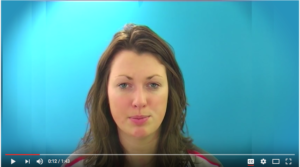
Want to participate? We’re looking for more folks to participate in both open source projects: STT engine development and the Common Voice application repository.
If programming is not your bag, you can always donate a few sentences to the Common Voice Project. You might read: “It made his heart rise into his throat” or “I have the diet of a kid who won $20.” Either way, it’s quick and fun. And it helps us offer developers an open source option that’s robust and affordable.
The post How Could You Use a Speech Interface? appeared first on The Mozilla Blog.
Firefox for iOS Offers New and Improved Browsing Experience with Tabs, Night Mode and QR Code Reader
Here at Firefox, we’re always looking for ways for users to get the most out of their web experience. Today, we’re rolling out some improvements that will set the stage for what’s to come in the Fall with Project Quantum. Together these new features help to enhance your mobile browsing experience and make a difference in how you use Firefox for iOS.
New Tab Experience
We polished our new tab experience and will be gradually rolling it out so you’ll see recently visited sites as well as highlights from previous web visits.
Night Mode
For the times when you’re in a dark room and the last thing you want to do is turn on your cellphone to check the time – we added Night Mode which dims the brightness of the screen and eases the strain on your eyes. Now, it’ll be easier to read and you won’t get caught checking your email.
https://blog.mozilla.org/wp-content/uploads/2017/07/NightMode12-2.mp4
QR Code Reader
Trying to limit the number of apps on your phone? We’ve eliminated the need to download a separate app for QR codes with a built-in QR code reader that allows you to quickly access QR codes.
Feature Recommendations
Everyone loves shortcuts and our Feature Recommendations will offer hints and timesavers to improve your overall Firefox experience. To start, this will be available in US and Germany.
To experience the newest features and use the latest version of Firefox for iOS, download the update and let us know what you think.
We hope you enjoy it!
The post Firefox for iOS Offers New and Improved Browsing Experience with Tabs, Night Mode and QR Code Reader appeared first on The Mozilla Blog.
Firefox Focus for Android Hits One Million Downloads! Today We’re Launching Three New User-Requested Features
Since the launch of Firefox Focus for Android less than a month ago, one million users have downloaded our fast, simple privacy browser app. Thank you for all your tremendous support for our Firefox Focus for Android app. This milestone marks a huge demand for users who want to be in the driver’s seat when it comes to their personal information and web browsing habits.
When we initially launched Firefox Focus for iOS last year, we did so based on our belief that everyone has a right to protect their privacy. We created the Firefox Focus for Android app to support all our mobile users and give them the control to manage their online browsing habits across platforms.
Within a week of the the Firefox Focus for Android launch, we’ve had more than 8,000 comments, and the app is rated 4.5 stars. We’re floored by the response!
Feedback from Firefox Focus Users“Awesome, the iconic privacy focused Firefox browser now is even more privacy and security focused.”
“Excellent! It is indeed extremely lightweight and fast.”
“This is the best browser to set as your “default”, hands down. Super fast and lightweight.”
“Great for exactly what it’s built for, fast, secure, private and lightweight browsing. “
New FeaturesWe’re always looking for ways to improve and your comments help shape our products. We huddled together to decide what features we can quickly add and we’re happy to announce the following new features less than a month since the initial launch:
- Full Screen Videos: Your comments let us know that this was a top priority. We understand that if you’re going to watch videos on your phone, it’s only worth it if you can expand to the full size of your cellphone screen. We added support for most video sites with YouTube being the notable exception. YouTube support is dependent on a bug fix from Google and we will roll it out as soon as this is fixed.
- Supports Downloads: We use our mobile phones for entertainment – whether it’s listening to music, playing games, reading an ebook, or doing work. And for some, it requires downloading a file. We updated the Firefox Focus app to support files of all kind.
- Updated Notification Actions: No longer solely for reminders to erase your history, Notifications now features a shortcut to open Firefox Focus. Finally, a quick and easy way to access private browsing.
We’re on a mission to make sure our products meet your needs. Responding to your feedback with quick, noticeable improvements is our way of saying thanks and letting you know, “Hey, we’re listening.”
You can download the latest version of Firefox Focus on Google Play and in the App Store. Stay tuned for additional feature updates over the coming months!
The post Firefox Focus for Android Hits One Million Downloads! Today We’re Launching Three New User-Requested Features appeared first on The Mozilla Blog.
